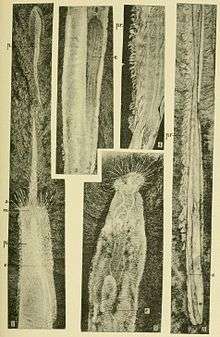Louisella
| Louisella Temporal range: Middle Cambrian | |
|---|---|
 | |
| Retouched images from Walcott's description of Miskoia, now synonymized with Louisella | |
| Scientific classification | |
| Kingdom: | Animalia |
| Stem-group: | Priapulida (?) |
| Class: | †Archaeopriapulida |
| Family: | Miskoiidae Walcott, 1911 |
| Genus: | Louisella Walcott, 1911 |
| Species | |
| |
Louisella is a genus of priapulid worm known from the Middle Cambrian Burgess Shale. It was originally described by Charles Walcott in 1911 as a holothurian enchinoderm,[1] and represents a senior synonym of Miskoia, which was originally described as an annelid.[2] 48 specimens of Louisella are known from the Greater Phyllopod bed, where they comprise < 0.1% of the community.[3] It has palaeoscolecid-like sclerites.[4]
External links
- "Louisella pedunculata". Burgess Shale Fossil Gallery. Virtual Museum of Canada. 2011.
References
- ↑ Durham, J. W. (1974). "Systematic Position of Eldonia ludwigi Walcott". Journal of Paleontology. Paleontological Society. 48 (4): 750–755. doi:10.2307/1303225 (inactive 2015-02-28). JSTOR 1303225.
- ↑ Walcott, C. D. (1911). "Cambrian Geology and Paleontology II. Middle Cambrian annelids". Smithsonian Miscellaneous Collections. 57 (5): 109–145.
- ↑ Caron, Jean-Bernard; Jackson, Donald A. (October 2006). "Taphonomy of the Greater Phyllopod Bed community, Burgess Shale". PALAIOS. 21 (5): 451–65. doi:10.2110/palo.2003.P05-070R. JSTOR 20173022.
- ↑ Conway Morris, S. (1997). "The cuticular structure of the 495-Myr-old type species of the fossil worm Palaeoscolex, P. piscatorum (?Priapulida)". Zoological Journal of the Linnean Society. 119: 69. doi:10.1111/j.1096-3642.1997.tb00136.x.
This article is issued from Wikipedia - version of the 4/27/2016. The text is available under the Creative Commons Attribution/Share Alike but additional terms may apply for the media files.